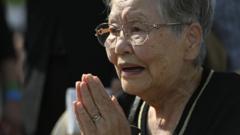On Wednesday, Hiroshima paused for a moment of silence to commemorate 80 years since the atomic bomb was dropped by the United States, an event that changed the trajectory of warfare and shaped global politics. The ceremony, attended by Japanese Prime Minister Shigeru Ishiba, city mayor Kazumi Matsui, and international representatives, reflected a mix of somber remembrance and urgent advocacy for peace.
Mayor Matsui highlighted the troubling global trend of military escalation and called for a renewed commitment to nuclear disarmament, lamenting the "flagrant disregard" for the historical lessons learned from Hiroshima and Nagasaki. The bombings resulted in over 200,000 immediate deaths, with many more suffering from long-term radiation effects.
Survivors like Shingo Naito, who lost his father and siblings in the devastation, are sharing their harrowing experiences to educate the younger generations. Naito's story, filled with pain, has inspired students in Hiroshima to express the tragedy through art. The global recognition of these stories is underscored by the Nobel Peace Prize awarded to Nihon Hidankyo, an advocacy group of atomic bomb survivors.
The mayor also stressed the critical state of the nuclear Non-Proliferation Treaty, warning it risks becoming ineffective. He urged the Japanese government to embrace the Treaty on the Prohibition of Nuclear Weapons, highlighting a stark contrast between nuclear-armed states that view such weapons as essential for national security and the hopeful vision for a nuclear-free world.
In the face of ongoing global conflict, survivors like Satoshi Tanaka draw painful parallels between their past experiences and current crises, advocating for heightened global outrage and action against the threats posed by nuclear arms. The streets of Hiroshima echo these sentiments, as calls for the abolishment of nuclear weapons surge, emphasizing the desire for a world where “atomic bomb hell” is never repeated.


















